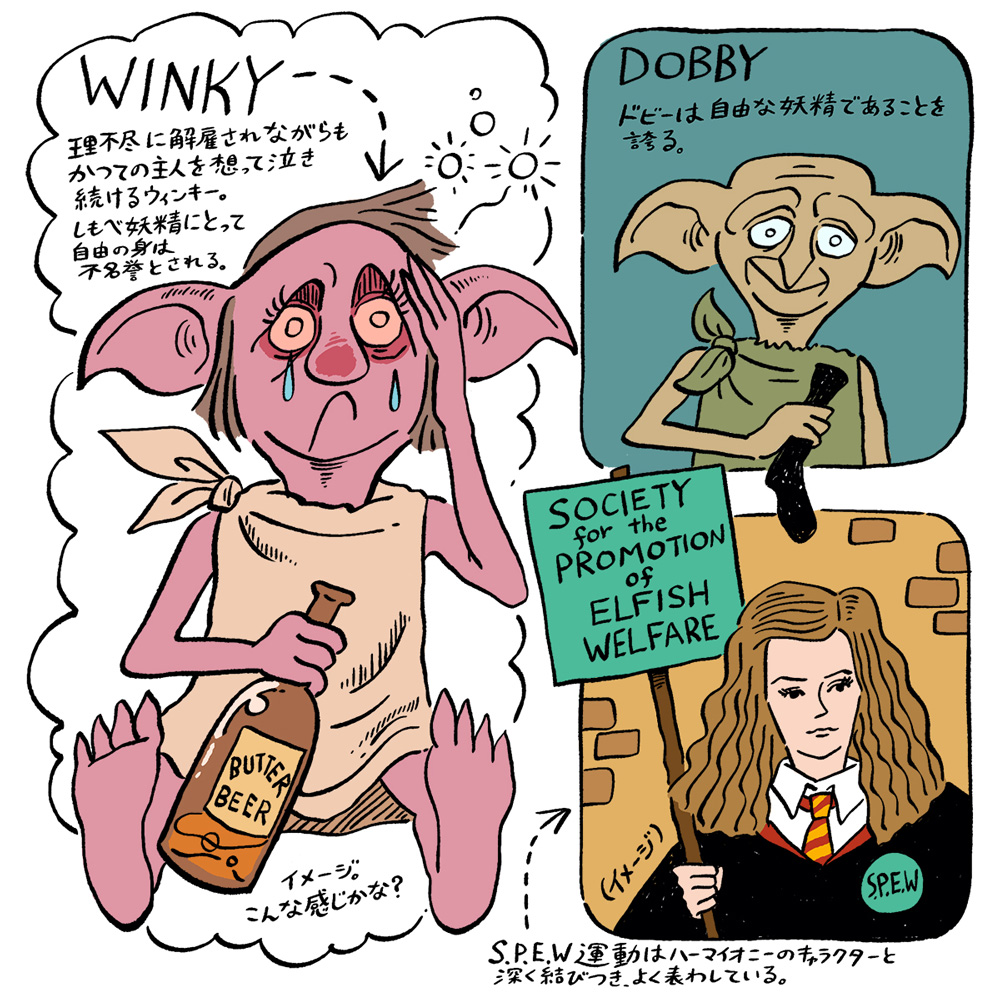!["Harry Potter" The magical world that was not made into a movie [Mizumaru Kawahara's CINEMONOLOGUE Vol.51]](https://cinemore.jp/images/d8edd5d238ac96042e1ca93b30e6b16db14cac6e8d95d14a6739d168bb4a8fb5.jpg)
"Harry Potter" The magical world that was not made into a movie [Mizumaru Kawahara's CINEMONOLOGUE Vol.51]
Winky and the House Fairy Welfare Promotion Association

Dobby, the house elf who appeared in `` Chamber of Secrets ,'' is a mascot like characters like Yoda, Mogwai, and Gollum because of his appearance, but as the name suggests, house elves are She is a versatile fairy who has served wizards as a servant since ancient times. Servant fairies are wrapped in non-clothing items such as pillowcases and towels, and if their master gives them even a single piece of proper clothing (even just one sock), they will be "fired" and set free. For most servant elves, labor service is an honor, and being free is considered dishonorable and frightening. It is probably rooted in the ``fairy who does work and housework for you'', as represented by the ``dwarf shoemaker'' (the fairy in ``dwarf shoemaker'' also appears when receiving clothes as a thank you). ).
However, thanks to Harry's quick thinking, Dobby is freed from the vicious and prestigious Malfoy family, and since then he has come to consider himself a free fairy, an extremely rare existence. There is also a named character named Kreacher, a servant fairy who works in the family home of Harry's godfather, Sirius Black, but the original story actually features another servant fairy who plays an important role. That is Winky.
In the original story, Winky, who appears in the fourth year's `` Goblet of Fire ,'' was a servant fairy who served Bartemius Crouch, a bureaucrat at the Ministry of Magic, but she left her assigned post at the Quidditch World Cup venue. Above, he was fired from his job after being accused of causing the symbol of the Dark Lord Voldemort to appear in the sky. Winky, who has served Crouch devotedly for many years, is not happy like Dobby, and even after being welcomed to Hogwarts by Headmaster Dumbledore, Winky continues to cry for his former master while soaking in Butterbeer. It was.
This master-servant relationship between Crouch and Winky, and Crouch's attitude in disgracing Winky, who was clearly innocent, after being humiliated in front of other officials, are important in Goblet of Fire. This is one of the hints, but in the movie version where Winky's presence was completely removed, Crouch's surroundings became a little harder to understand. With Winky, who is the hint that connects Crouch and his family, missing, the appearance of his son Bartemius Crouch Jr. in the second half feels a little abrupt.
That's not the only thing Winky's absence has affected. Witnessing Winky's unreasonable dismissal, Hermione, who has an honest personality, cannot forgive it and sympathizes with Winky, but her feelings eventually develop into doubts about the wizarding world that uses house elves as servants. In fact, it becomes clear that there are over 100 servant elves living at Hogwarts, and that the castle's always-clean castle grounds and luxurious meals are all made possible by their unpaid labor. Hermione loses the will to eat the food served by what she calls "slave labor" and feels guilty as a member of the school, eventually joining the Society for the Promotion of House-Elf Welfare (SPEW). (The other members had automatically joined before they knew it, so Harry was the secretary and Ron was the treasurer).
From then on, this movement becomes one of Hermione's life's work, but as mentioned above, this part is also not depicted in the movie version, where Winky does not appear in the first place. In an already long and complicated story, it can't be helped since it doesn't directly relate to the main plot, but it was interesting because Hermione's serious and enthusiastic personality was well expressed. It's not only a school-style story about honor students working on a social movement, but it also works as a parody of the idea of combining the familiar folklore of the helping fairy with the real-life labor movement. Also, considering that Hermione's surname "Granger" comes from the Granger Movement, a peasant movement that occurred in America in the 1870s, SPEW can be said to be an element deeply connected to her character.

